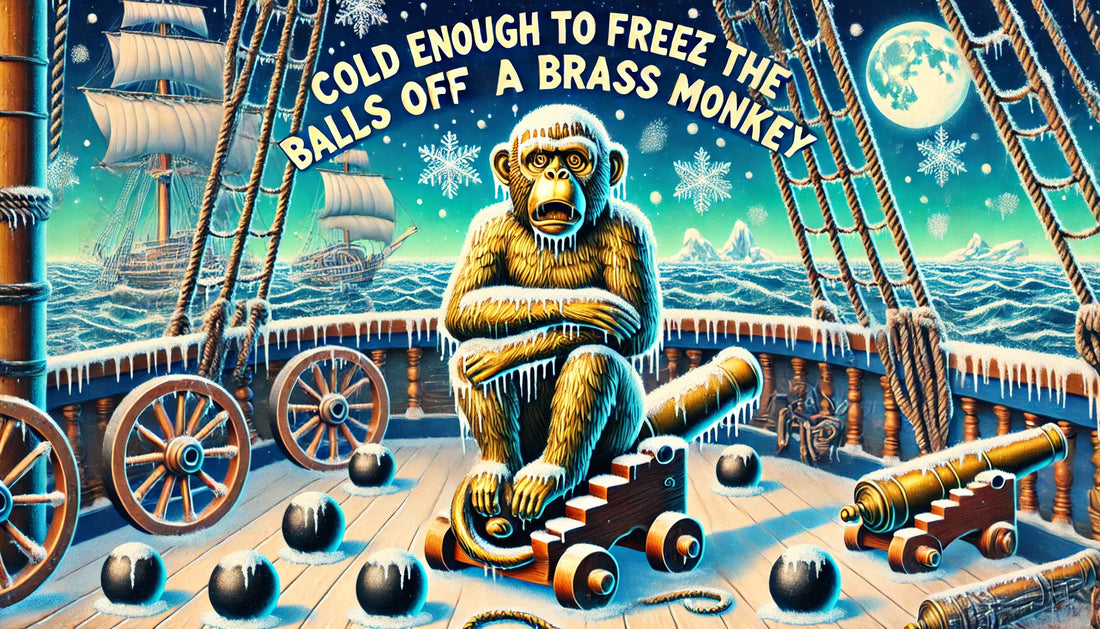
Cold Enough to Freeze the B*lls Off a Brass Monkey—and Other Phrases You’re Using Wrong
Ahoy, Old Salts!
You salty sea dogs! Welcome to 2025—another year to drink coffee, talk smack, and stay caffeinated enough to tolerate the landlubbers around us. Ever wonder why we say things like “pipe down” or “three sheets to the wind”? Spoiler alert: it’s not because of TikTok. These phrases were born in the belly of wooden ships, shouted by grizzled Sailors who probably hadn’t showered in a month. So grab a mug of Old Salt Coffee, and let’s dive into 21 everyday sayings that’ll make you feel like you’re back on the high seas—minus the scurvy.
1. Aloof
If someone’s standing "aloof," they’re keeping their distance, perhaps a little standoffish. This term originates from Sailors steering a ship "a-loof," meaning into the wind to stay clear of a lee shore or other hazards. It was a practical maneuver to prevent shipwrecks or other maritime disasters. These days, whether it's avoiding small talk at a party or steering clear of drama, you're using a phrase straight from the quarterdeck.
Learn more about sailing into the wind.
2. Bitter End
The "bitter end" refers to the last part of a rope or chain—the end attached to the ship's bitts (sturdy posts on the deck). When a line was paid out to its full length, Sailors reached the bitter end, often when anchoring or during emergencies. On land, it’s come to symbolize perseverance—seeing something through even when the going gets tough, like enduring a marathon workday or the final season of your favorite TV show.
What are bitts? Find out here.
3. Chew the Fat
Sailors on long voyages would pass the time by chewing on tough, salted meat, often while engaging in idle chatter. This was no gourmet treat but a way to stave off hunger while sharing tales of adventures or gripes about life at sea. Today, when you’re casually catching up with friends over coffee, you’re keeping a tradition alive that spans centuries and salty decks.
4. Cut and Run
In emergencies, Sailors might cut the anchor line to make a swift departure, especially to evade storms, pirates, or enemy ships. Cutting and running was a bold decision to prioritize survival over the cost of an anchor. Now, it’s used to describe making a hasty exit from an uncomfortable or dangerous situation—whether that’s dodging a long meeting or bailing on a bad first date.
Discover more about anchor lines and nautical terminology.
5. Loose Cannon
A "loose cannon" on a ship's deck was a serious hazard, as the massive weapon could roll uncontrollably and cause severe damage to the crew and the vessel. Securing cannons was a top priority, especially during rough seas or battle. Today, the term refers to an unpredictable person who might metaphorically "roll around" and create chaos, whether in a workplace or a family gathering.
6. Mind Your P’s and Q’s
This phrase is believed to have originated in English pubs, where bartenders would track patrons' consumption of pints and quarts. Sailors, often paid in advance of their next voyage, needed to "mind their P's and Q's" to avoid spending all their wages in one night. Today, it’s a handy reminder to watch your manners—or your tab—whether at a formal event or a friendly pub.
7. No Room to Swing a Cat
This expression refers to the cramped quarters aboard ships, where there was barely enough space to swing a "cat-o'-nine-tails," a whip used for punishment. The phrase highlights the limited space Sailors endured while living and working below deck. Nowadays, it describes any tight or crowded situation, whether it’s a tiny studio apartment or a packed subway car.
8. Pipe Down
The boatswain's pipe was used to signal various orders, including the command for lights out or quiet time. "Pipe down" meant it was time for silence, rest, or reduced activity, especially after a long day’s work. In modern settings, it’s a polite (or not-so-polite) way to ask someone to stop talking or making noise—perfect for tired parents or annoyed coworkers.
9. By and Large
Sailing "by and large" meant a vessel could perform well both by (close to) the wind and large (with the wind), demonstrating adaptability and skill in navigation. This phrase became a metaphor for versatility and proficiency. Today, it means "on the whole" or "generally speaking," applicable whether you’re summarizing a situation or describing a well-rounded person.
10. Son of a Gun
Children born aboard naval ships, sometimes to women accompanying the crew or stationed aboard, were referred to as "sons of a gun." This practice was often associated with life on ships where space was tight and privacy nonexistent. Today, it’s a playful or affectionate term, often used to express surprise or admiration for someone who’s pulled off a bold or unexpected move.
11. Taken Aback
If the wind unexpectedly hit a ship's sails from the front, it was said to be "taken aback," leaving the vessel temporarily unmanageable. This was an alarming and sometimes dangerous situation requiring quick action from the crew. Now, the phrase describes moments of surprise or shock that leave you momentarily speechless, like when your coffee order is unexpectedly perfect on the first try.
12. Under the Weather
The phrase "under the weather" is commonly used to describe someone feeling ill, but its origins are nautical. Sailors who were unwell would go below deck to escape harsh weather, quite literally placing themselves under the weather. Another theory links it to the “weather bow,” the side of the ship facing the brunt of a storm, where conditions were most grueling. Either way, it’s a reminder that life at sea wasn’t for the faint of heart—or stomach.
Explore the origins of “under the weather”.
13. Three Sheets to the Wind
In sailing, "sheets" are the ropes controlling the sails. If three sheets were loose, the sails would flap uncontrollably, causing the ship to stagger like a drunken Sailor. This vivid image translates perfectly to modern use, describing someone who’s had far too much to drink and is swaying like a tipsy frigate.
14. High and Dry
A ship stranded on land due to receding tides was left "high and dry," unable to move until the water returned. For Sailors, this was an inconvenient and potentially dangerous predicament. Today, it’s a metaphor for being left in a difficult or helpless situation, whether it’s being abandoned by friends or caught without coffee during a morning crisis.
15. Scuttlebutt
The "scuttlebutt" was a cask of drinking water on a ship where Sailors would gather to hydrate and exchange news or gossip. It was essentially the shipboard equivalent of the modern water cooler. Now, it refers to rumors or informal chatter, whether in the office or among friends.
16. Hand Over Fist
This term describes the rapid motion of hauling in a rope, hand over fist, often during high-pressure situations like storms or battles. It symbolized quick and steady progress—a fitting metaphor for success or rapid achievement. Today, it’s often used to describe raking in profits or advancing in a career.
17. Between the Devil and the Deep Blue Sea
The "devil" was a seam between the deck planking and the ship's side, requiring precarious maintenance by Sailors. Working on it placed them between a hard place (the devil seam) and the deep sea. Today, it’s a poetic way to describe being trapped between two equally unpleasant options, like deciding between laundry or dish duty.
18. Devil to Pay
Originally, "paying the devil" referred to sealing the devil seam with pitch, a tedious and unpleasant task. For Sailors, it was hard work; for us, it’s a metaphor for trouble brewing or dealing with the consequences of poor decisions.
19. Shipshape
Life aboard a ship demanded order and tidiness, with everything secured against rolling waves. "Shipshape" became synonymous with cleanliness, organization, and readiness. Today, whether it’s your tidy living room or a well-organized workspace, you’re channeling the discipline of Sailors past.
20. Let the Cat Out of the Bag
Smugglers hiding contraband or Sailors revealing secrets gave rise to this term. Once the "cat" was out of the bag, there was no turning back. It’s the perfect phrase for spilling secrets—whether about surprise parties or top-secret coffee blends.
21. Cold Enough to Freeze the Balls Off a Brass Monkey
This one has sparked plenty of debate, but it remains one of the most colorful phrases with a possible nautical origin. It may not be true, but hey it's a fun story nonetheless. On ships with cannons, iron cannonballs were often stacked in a pyramid shape for efficient storage. To keep them in place, a brass frame, nicknamed a "monkey," was used. However, when temperatures dropped significantly, the brass and iron would contract at different rates due to the metals’ properties, potentially causing the cannonballs to spill out onto the deck—hence, "cold enough to freeze the balls off a brass monkey." While some question its authenticity as a historical fact, it’s a hilarious way to describe teeth-chattering cold weather, and it’s guaranteed to bring a laugh (and possibly some debate) at any gathering.
Learn more about the myth and history of the Brass Monkey.
Hoist Your Mug and Celebrate!
And there you have it, Shipmates—proof that Sailors have been shaping our language while dodging cannonballs and bad coffee since forever. Next time you tell someone to “cut and run” or complain about being “three sheets to the wind,” remember: you’re keeping naval history alive (and hopefully not spilling your coffee). Speaking of coffee, if you’re not sipping Old Salt’s finest, are you even a real Old Salt? Hoist a mug of Liberty Call or Green Eyes, and fuel up for whatever stormy seas 2025 throws your way. Let’s make this year salty, caffeinated, and downright unforgettable. Cheers to the journey, you scallywags! Visit Old Salt Coffee to discover your next favorite brew, and let the journey begin, Shipmates!

